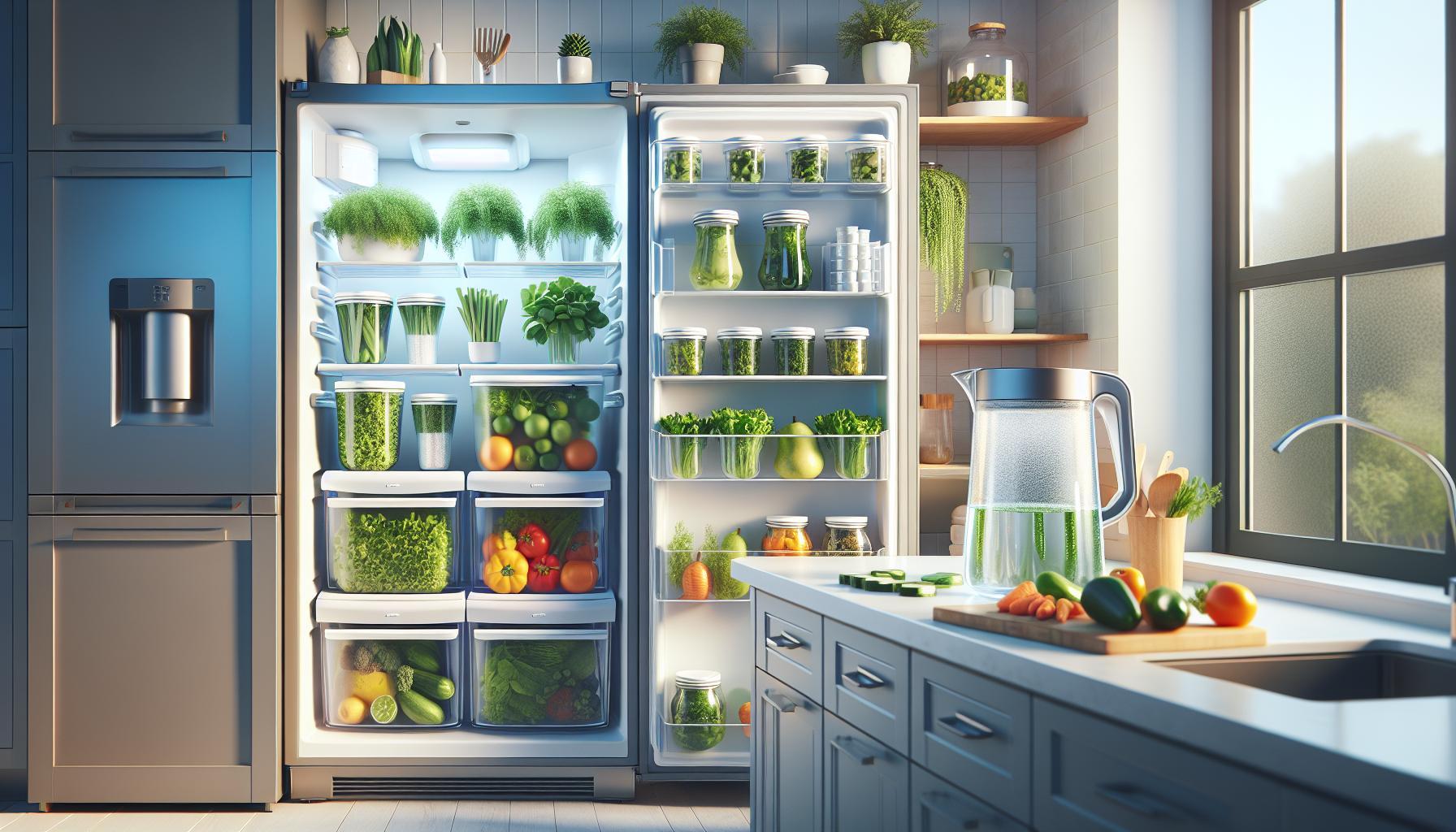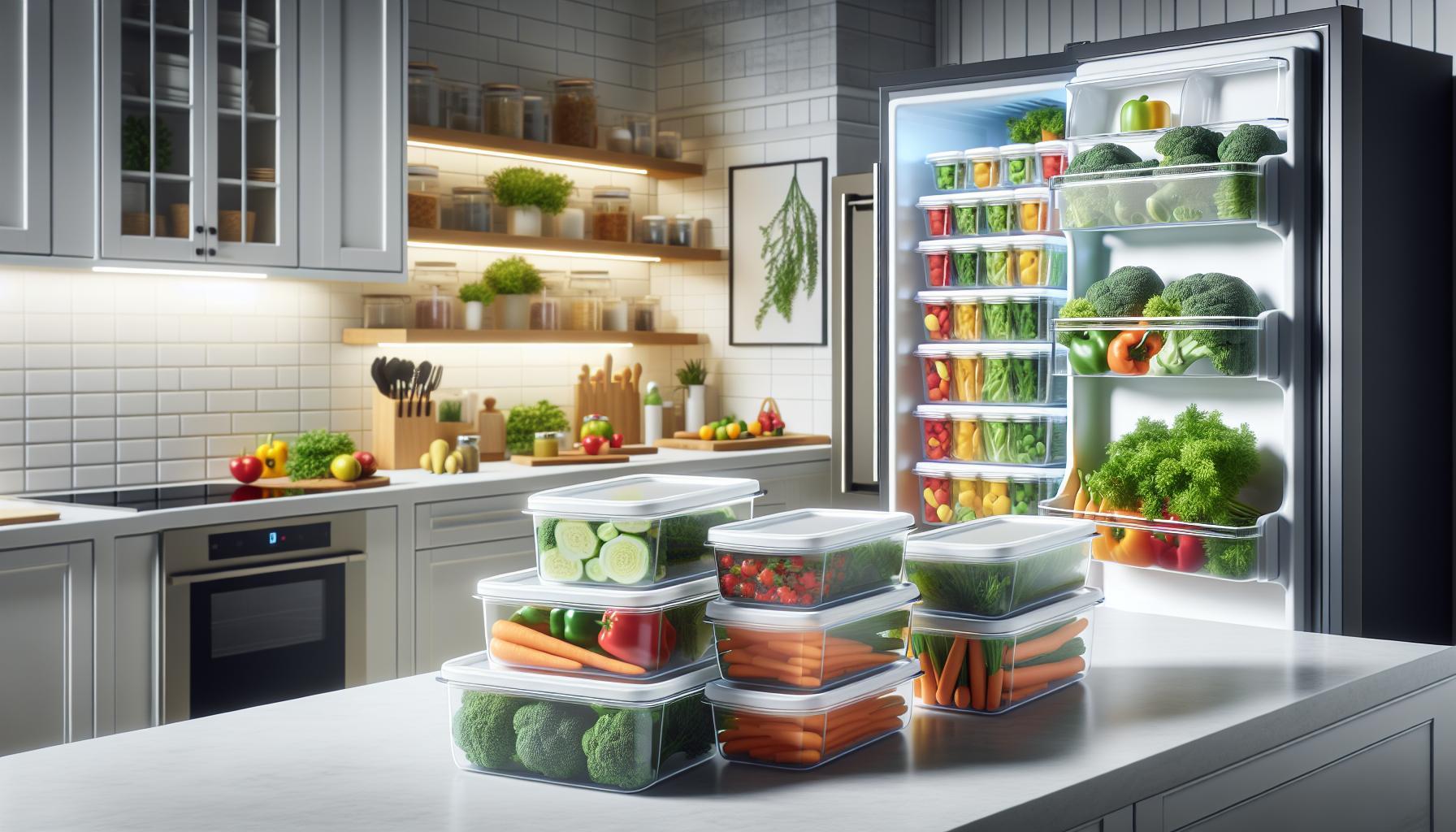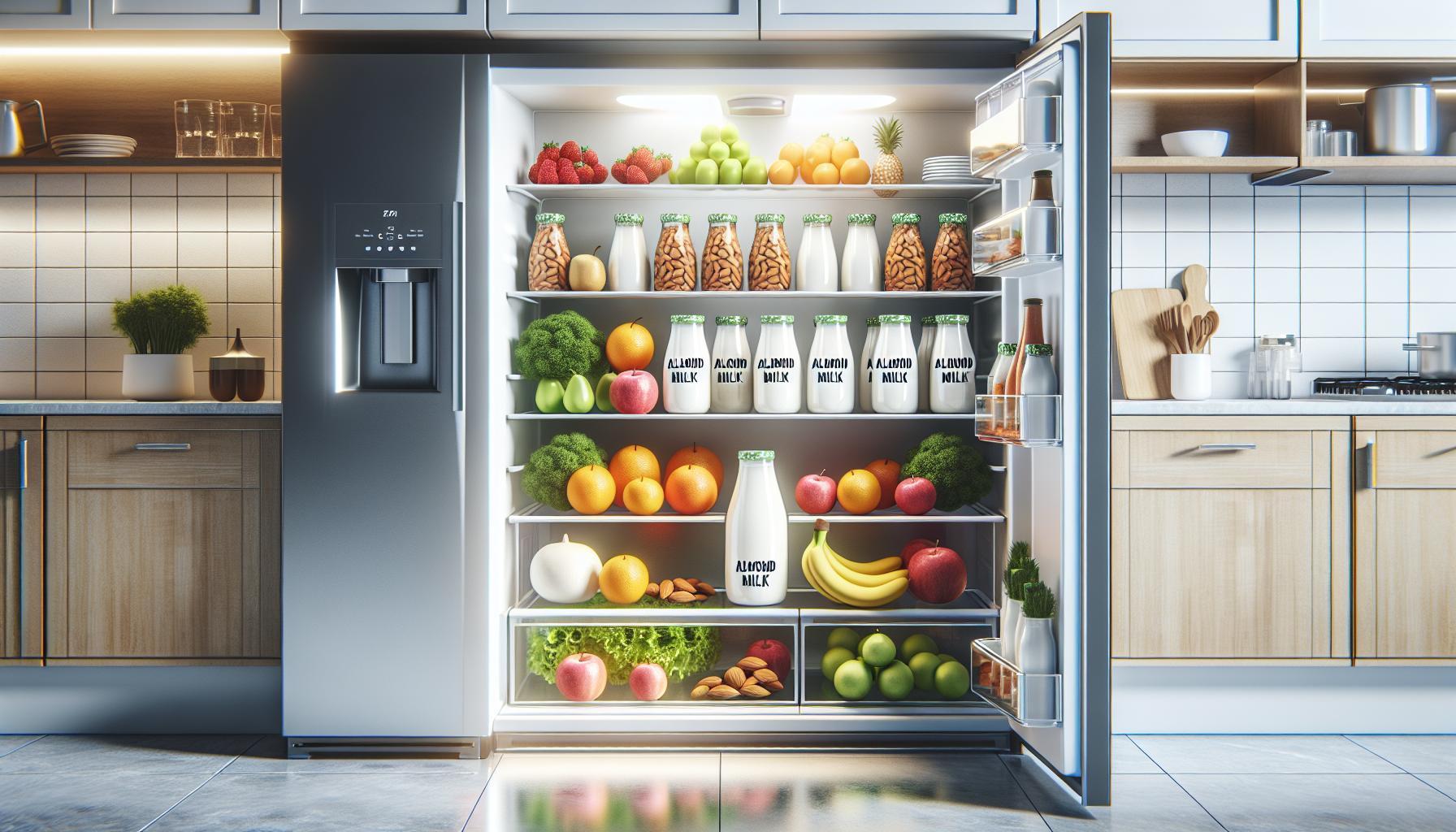Did you know that using a fridge water filter can significantly improve the taste and quality of your drinking water? However, many people overlook one crucial aspect: how often these filters need replacing. Over time, contaminants build up, affecting not just taste but also safety.
In this article, we’ll explore how long fridge water filters typically last and why regular replacement is essential for ensuring clean, fresh water. Whether you’re concerned about your family’s health or looking to maximize the efficiency of your appliance, understanding the lifespan of water filters will empower you to make informed decisions. Join us as we delve into practical guidelines, so you can enjoy peace of mind with every sip.
How Long Do Fridge Water Filters Typically Last?
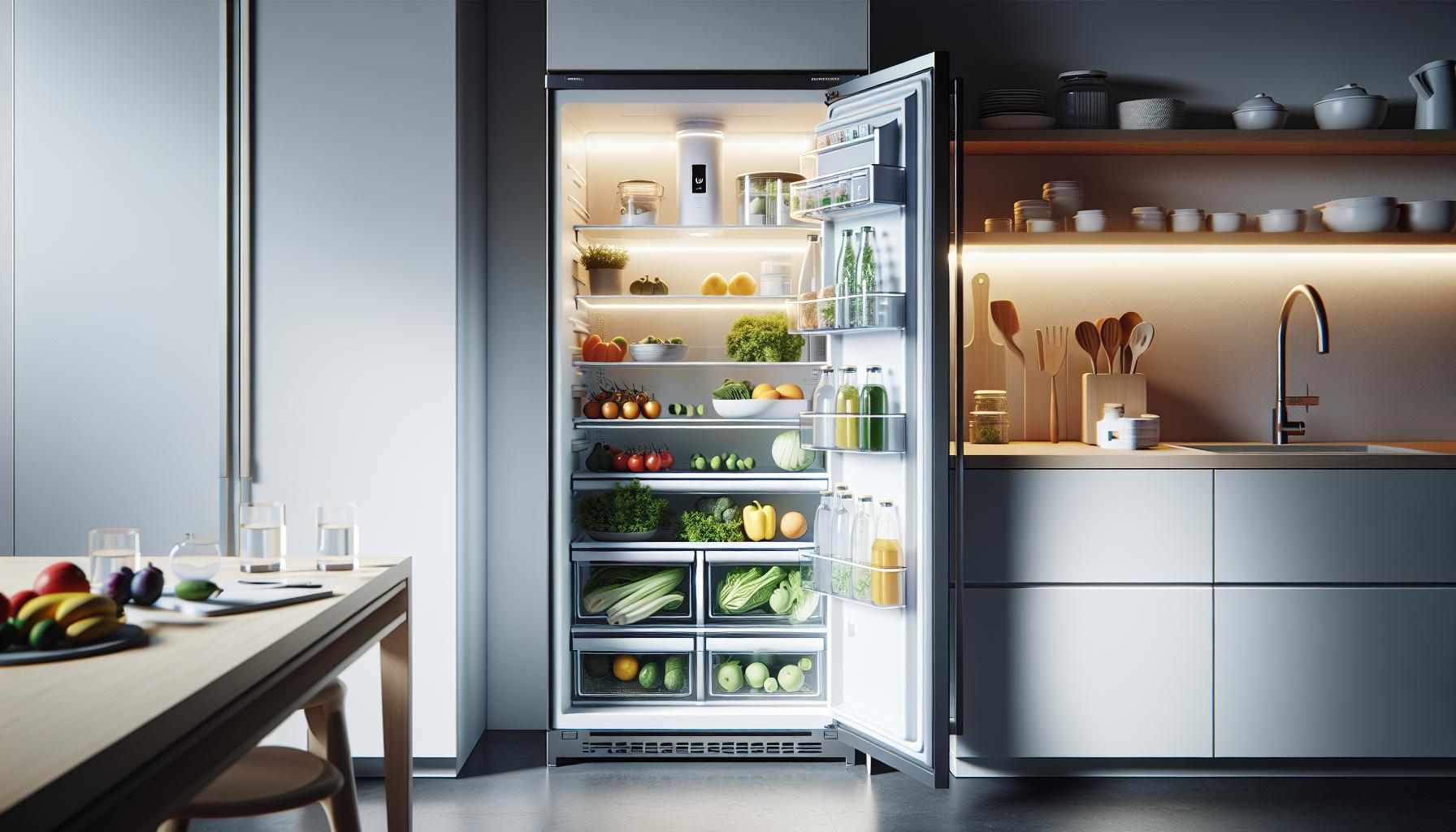
The lifespan of fridge water filters is an important consideration for anyone using a refrigerator that dispenses water or ice. Typically, these filters are designed to last between 6 months to 1 year, depending on various factors. Regularly replacing your water filter is essential not only for maintaining the quality of your drinking water but also for ensuring that your refrigerator operates efficiently.
Several factors can influence how long a water filter lasts. The water quality entering your home plays a significant role; if your water has a high level of contaminants, the filter may become clogged more quickly. Additionally, the amount of water your household consumes can dictate how often you need to change the filter-higher usage means faster depletion of the filter’s capabilities. Some brands might even provide a filter change indicator that takes the guesswork out of knowing when it’s time for a replacement.
It’s also crucial to understand that over time, even the best filters will become less effective. If you notice a change in the taste or odor of your water, it may be an early sign that the filter is nearing the end of its life. Visual cues, such as discoloration or sediment in the water, should prompt immediate action. Regular monitoring and timely replacements will ensure that your family is drinking clean and safe water.
Factors Affecting Fridge Water Filter Lifespan
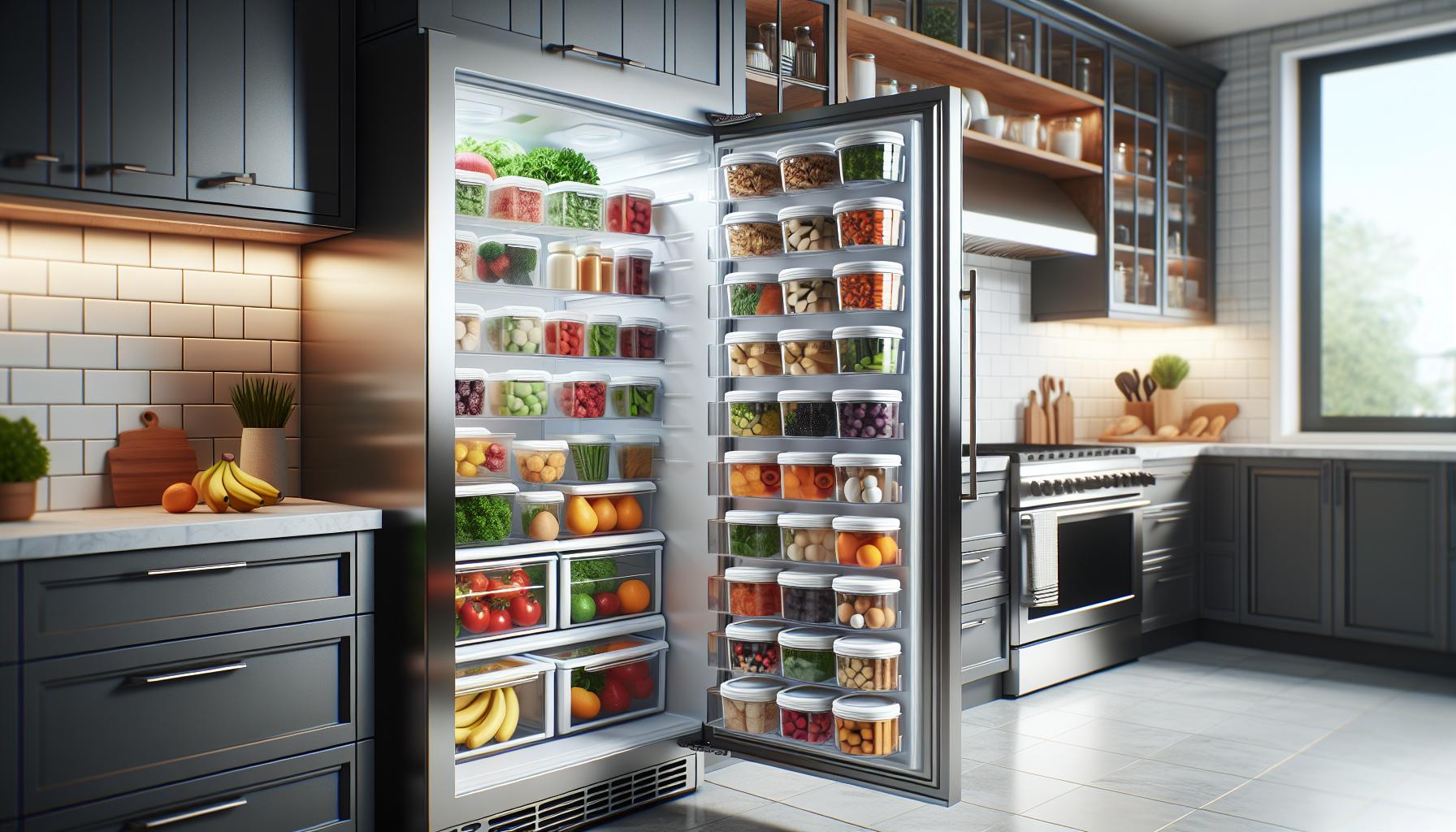
The performance and longevity of fridge water filters hinge on a variety of interconnected factors. Understanding these variables can help you maintain cleaner, fresher drinking water, ensuring you’re all set for healthy hydration at home. One of the primary elements that impact filter lifespan is water quality. Municipal water supplies often contain a mix of sediment, chlorine, and other contaminants. If your source water is heavily polluted or has high levels of minerals, your filter will likely reach its limit sooner, requiring more frequent replacements.
Another significant factor is the volume of water usage in your household. A busy family might go through several gallons of filtered water each day, leading to a more rapid filter capacity depletion when compared to a household that uses water sparingly. As a helpful reference, many manufacturers suggest calculating your filter’s lifespan based on average usage; for example, the more you consume, the shorter the lifespan of the filter.
Temperature and storage conditions can also play a role. High temperatures or fluctuations in temperature can weaken the filter’s structure, diminishing its filtering effectiveness. It’s advised to keep the refrigerator at a consistent, safe temperature to maximize filter longevity. Additionally, filters that are nearing their expiration date but have been stored improperly may lose efficiency even before they are first used.
Lastly, adhering to manufacturer guidelines regarding installation and maintenance is crucial. Filters vary in design and capability, so following specific instructions can influence their effectiveness. For instance, a filter that’s not installed properly may compromise water flow, leading to quicker clogging. Keeping these factors in mind can enhance your filter management strategy, ensuring that you always have access to safe, clean drinking water.
Signs Your Water Filter Needs Replacement
The quality of your drinking water can decline without warning, often due to an aging or clogged water filter. Knowing the signs that indicate your water filter needs replacement is crucial for ensuring clean, fresh water. One of the primary indicators is a noticeable change in taste or odor. If your filtered water begins to taste off or has a different smell, it could mean your filter is no longer effectively removing contaminants, signaling that it’s time for a change.
Another clear sign to watch for is a significant reduction in water flow. If you notice that the flow of water from your fridge’s dispenser has slowed down considerably, it may be a result of a saturated filter becoming clogged with particulates. Similarly, if the filter indicator light on your fridge is activated or flashing, it’s often a straightforward prompt to replace your filter, suggesting that it has reached its usage limit.
Physical changes in the filter itself can also provide insight into its condition. Spotted discoloration, residues, or unexpected leaks in the filter compartment can be warning signs of a failing filter. Additionally, filters usually come with a lifespan rating-commonly around six months to a year depending on water usage, quality, and type. Regularly checking the filter as per the manufacturer’s recommendations is essential for maintaining optimal performance.
It’s important to keep track of your water filter replacement schedule. Establishing a reminder system, whether through a calendar alert or an app, can help ensure that you replace the filter at the recommended intervals. By being proactive, you can avoid potential water quality issues, ensuring that you consistently enjoy clean, refreshing water.
Different Types of Fridge Water Filters Explained
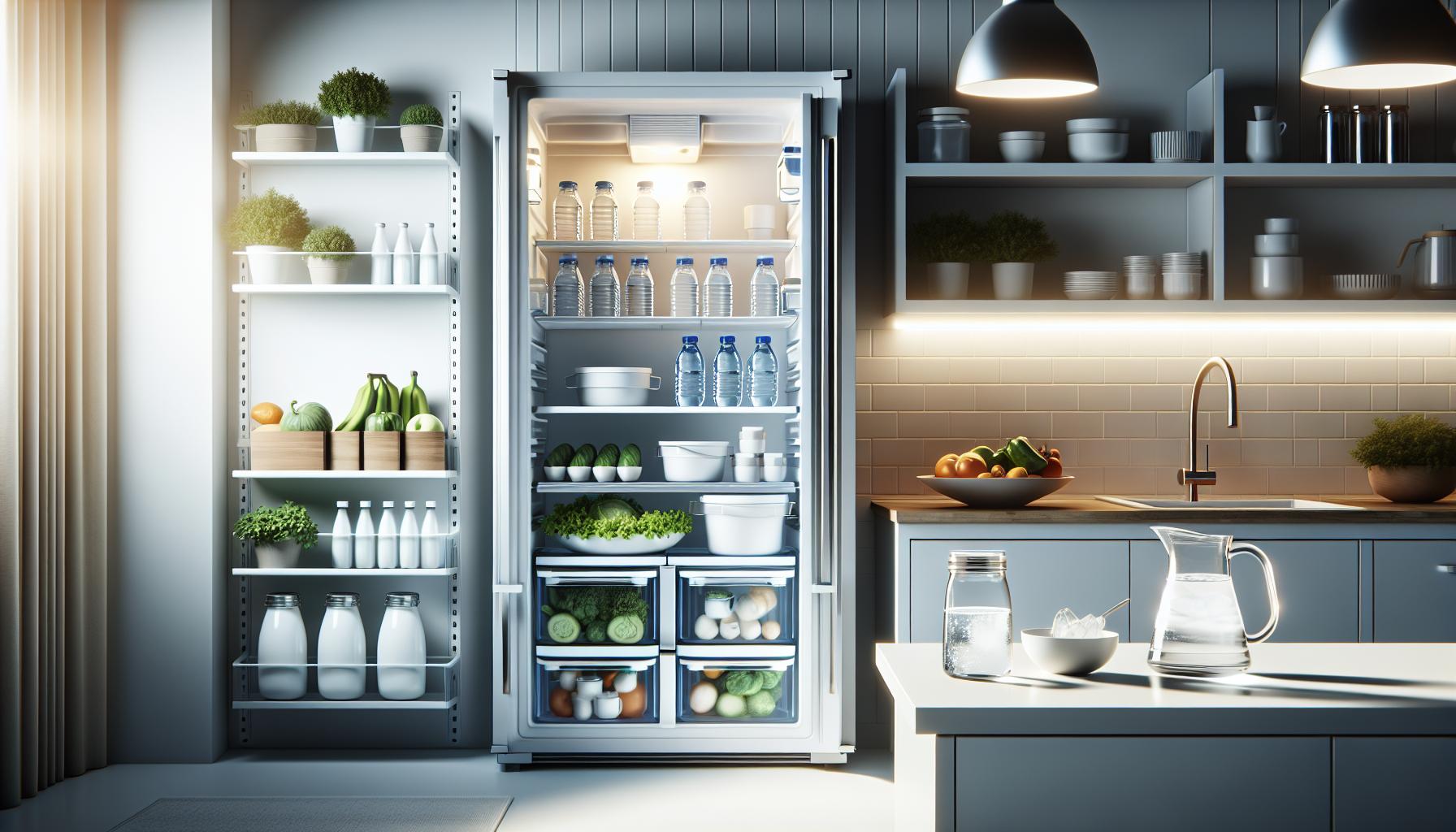
Understanding the various types of fridge water filters is vital for maintaining the quality of your drinking water. Each filter type employs unique technologies to ensure contaminants are effectively removed, and choosing the correct one can greatly enhance the safety and taste of your water. The most common types include activated carbon filters, reverse osmosis filters, and sediment filters, each serving a distinct purpose in the filtration process.
Activated Carbon Filters
Activated carbon filters are the most prevalent in home refrigerators. They work by adsorbing impurities, particularly chlorine, which significantly improves the taste and smell of water. These filters are effective at removing certain heavy metals and organic compounds, making them suitable for city water supplies that often contain chlorine and other disinfectants. Typically, these filters need to be replaced every six months to a year, depending on usage and water quality.
Reverse Osmosis Filters
Reverse osmosis (RO) filters are more complex and provide a higher level of purification. They work by forcing water through a semi-permeable membrane that filters out a wide range of contaminants, including salts, minerals, and many organic substances. While RO systems can produce highly purified water, they are typically more expensive and may require more maintenance than activated carbon filters. Replacement intervals can vary widely, spanning from one to three years, depending on the specific model and local water quality.
Sediment Filters
Sediment filters are designed to trap larger particles, such as dirt, rust, and sand, that can clog and damage other filtration systems. These filters are usually used as a pre-filter component within multi-stage filtration systems. Depending on the clarity of your water, sediment filters might need replacing every three to six months. For those in areas with heavy sediment issues, regular replacement is critical for preventing disruptions in water flow and protecting other filter types.
Understanding these filter types and their respective lifespans not only helps you make informed decisions about replacement schedules but also overall system maintenance. Regularly assessing the condition of your fridge’s filtration system ensures that you are consuming clean, safe, and great-tasting water.
Storage and Maintenance Tips for Longevity
Maintaining the lifespan of your refrigerator’s water filter is crucial for ensuring that your drinking water remains fresh and safe. With proper storage and maintenance practices, you can maximize the effectiveness of your filter and enjoy clean water for longer periods. Here are some essential tips to help you maintain and store your fridge water filter effectively.
Keep your water filter in a cool, dry location before installation, avoiding direct sunlight or extreme temperatures, as exposure can degrade the filter materials. Once installed, ensure that the filter is seated properly and that there are no leaks. To promote longevity, follow a schedule for regular replacements; typically, activated carbon filters should be changed every six months to a year, while reverse osmosis systems may need replacement every one to three years.
Monitor your water quality regularly. Indicators like unusual taste, odor, or a noticeable decrease in water flow may signal the need for a replacement. Additionally, check the manufacturer’s guidelines, which often provide specific recommendations tailored to your filter type. Keeping a record of your filter replacement dates can help you stay organized and proactive about maintenance.
Lastly, consider regular cleaning of your refrigerator’s interior to prevent the growth of mold and bacteria, which can affect filter performance. Wipe down surfaces with mild soap and water and pay special attention to the area around the filter. Practicing these good maintenance habits can ensure that your fridge water filter operates efficiently, providing you with clean, great-tasting water throughout its lifespan.
Impact of Water Quality on Filter Performance
Water quality plays a crucial role in the performance and lifespan of fridge water filters. The contaminants found in your water supply, including sediment, chlorine, heavy metals, and microorganisms, can significantly affect how efficiently a filter operates. For instance, water that is particularly hard or contains high levels of minerals can lead to quicker saturation of the filter, reducing its effectiveness and the quality of the water dispensed.
One key factor is the concentration of chlorine in your water. While many filters effectively reduce chlorine taste and odor, those designed for higher concentrations will experience shorter lifespans if faced with continuously elevated levels. In areas with sediment-rich water, like those that undergo periodic flooding or construction, filters may clog more rapidly, necessitating earlier replacements. Regular water testing can provide valuable insights into your water quality and help you gauge the appropriate filter replacement schedule.
In addition, different types of contaminants require specific filter technologies. For example, activated carbon filters excel at reducing chlorine and organic compounds, but for heavy metals such as lead or arsenic, a filter with reverse osmosis capabilities or specialized media is necessary. Understanding the specific contaminants present in your water enables you to select the most effective filter type, enhancing its ability to purify your drinking water and prolonging performance.
To maximize the , consider the following practical tips:
- Conduct regular water quality tests to identify contaminants.
- Select a filter designed for your specific water issues.
- Store filters in optimal conditions to maintain their efficacy.
- Stay informed about regional water quality reports that may indicate variations.
Being proactive about water quality not only ensures that your filters last longer but also guarantees that the water you consume remains clean, safe, and refreshing.
How to Properly Install and Replace Filters
Ensuring that your fridge water filter is correctly installed and replaced is essential for maintaining the quality of the water you consume. A properly functioning filter not only removes unwanted contaminants but also enhances the taste and safety of your drinking water. Fortunately, the process of installation and replacement is typically straightforward, allowing you to take charge of your water quality with a few simple steps.
First, before installation, confirm that you have the right filter compatible with your fridge model. You can usually find this information in the refrigerator’s user manual or by checking the manufacturer’s website. Once you have the correct filter, follow these steps for installation:
- Turn Off the Water Supply: If your refrigerator has a water supply valve, turn it off to prevent leaks or spills during the filter change.
- Remove the Old Filter: Depending on your refrigerator model, this might involve turning or pushing the old filter to release it. Keep a towel handy to catch any residual water.
- Prepare the New Filter: Remove any protective caps or packaging from the new filter. Some filters may require you to soak the cartridge in water for a few minutes before installation; consult the instructions that come with your filter.
- Install the New Filter: Align the new filter according to the manufacturer’s guidelines, ensuring a snug fit. For push-button filters, you may need to gently push until you hear a click indicating it’s securely in place.
- Turn the Water Supply Back On: Restoring the water supply will help the new filter start functioning immediately. After turning it on, check for any leaks around the filter.
- Flush the Filter: Run cold water through your dispenser for 2-5 minutes to clear out any carbon dust from the new filter. This ensures you receive clean, fresh water and minimizes any initial bad taste.
Regular replacement intervals typically range from every six months to once a year, depending on water quality and usage. Always keep an eye on your filter’s performance, as factors such as increased water use, changes in water quality, or visible discoloration of the water can necessitate earlier replacements.
Maintaining a proactive approach to your filter changes not only ensures safety and efficacy but also saves you money over time. Water quality directly impacts your filter’s longevity, so by understanding these installation and replacement processes, you can enjoy peace of mind knowing that your fridge is providing the best possible drinking water for your family.
Benefits of Regularly Replacing Water Filters
Regularly replacing your fridge water filter is not just a matter of convenience; it is essential for ensuring your family’s health and well-being. An efficient water filter significantly improves the quality of drinking water by removing contaminants such as chlorine, lead, sediment, and other harmful substances. Over time, filters become saturated with these impurities, which can lead to reduced efficiency and potential health risks if not replaced regularly. Maintaining clean water can prevent illnesses and provide peace of mind, allowing you to enjoy fresh-tasting water directly from your refrigerator.
Another significant advantage of timely filter replacement is the enhanced flavor of your drinking water. Old filters can impart undesirable tastes and odors, diminishing the enjoyment of your hydration habits. By ensuring a fresh filter is always in place, you can enjoy crisp, clean water that encourages you and your family to stay hydrated. Furthermore, regular maintenance ultimately extends the lifespan of your refrigerator’s water dispensing system, preventing future costly repairs associated with clogged or damaged lines caused by overused filters.
Establishing a routine for filter changes, typically every six months to a year, can significantly reduce the risk of contamination and ensure that your water quality remains high. Keeping track of when to replace your filter can be easily integrated into your home maintenance schedule. You might implement a reminder system using your phone or a calendar to help adhere to the replacement timeline. With this proactive approach, maintaining a healthy home environment becomes straightforward and manageable.
By regularly replacing your water filters, you not only safeguard your family’s health but also enjoy the benefits of improved taste and extended appliance life. Investing a little time and attention into this routine can yield substantial returns in the quality of your family’s drinking water, ensuring every sip is as refreshing and safe as it should be.
Understanding Manufacturer Recommendations and Guidelines
Understanding manufacturer recommendations for fridge water filters is crucial not only for ensuring pure, safe drinking water but also for maintaining the longevity of your refrigerator’s water dispensing system. Each manufacturer typically provides specific guidelines regarding how often filters should be replaced, usually based on the volume of water used or the time elapsed since the last change. Most manufacturers suggest changing the filter every six months, but this can vary depending on factors like water quality and usage patterns.
Following these recommendations helps avoid contamination from over-saturated filters that can no longer effectively remove impurities. For instance, filters designed for a household of four might need to be replaced more frequently if the water is heavily used for drinking, cooking, or ice making. Always check the user manual that accompanies your fridge or refer to the manufacturer’s website for precise instructions related to your model. These resources will often include a table outlining expected filter lifespans under various conditions.
Consumer safety should always be a priority, which is why adhering to these guidelines can safeguard against health hazards associated with outdated filters. It’s also advisable to regularly inspect and maintain the water filter compartments. Ensure that seals are not damaged and that the filter is properly seated, as improper installation can compromise water quality and lead to leaks.
To further assist, many manufacturers provide reminder systems or app integrations to alert homeowners when it’s time for a change. Leveraging technology can simplify the management of filter replacement and ensure that your family always has access to clean, fresh water. By following manufacturer guidelines, homeowners can confidently enjoy their drinking water, knowing they are taking the right steps for safety and appliance health.
Common Misconceptions About Water Filters
Many people have misconceptions about fridge water filters that can lead to less effective filtration and potentially unsafe drinking water. One common myth is that all water filters function the same way. In reality, filters vary significantly in terms of what contaminants they remove and how effectively they do so. For example, a filter designed primarily to reduce chlorine taste and odor may not effectively remove heavy metals or bacteria. Understanding the specific capabilities of your fridge’s water filter is essential to ensure you are actually getting clean water.
Another widespread belief is that if a water filter looks clean, it doesn’t need to be replaced. This can be misleading, as many contaminants cannot be seen with the naked eye, and a filter can be compromised even if it appears generally unclogged. Filters are designed to adsorb impurities; over time, they become saturated and can no longer function efficiently. Following manufacturer recommendations for replacement-typically every six months-is crucial for maintaining water quality.
Moreover, some consumers think that using generic or off-brand filters is just as good as the original manufacturer’s filters. However, generic filters may not have the same level of filtration performance. They might not meet the same stringent testing and safety standards established by the original manufacturer, leading to inconsistent water quality. Always check for certifications from independent testing organizations when purchasing alternative filters to ensure they meet required safety standards.
Lastly, there is a misconception that water filters eliminate the need to worry about the water source. Even the best-filtering system cannot guarantee purity if the water supply is compromised. It is important to regularly test the water source, especially in areas with known water quality issues, and to take additional steps if necessary. By debunking these misconceptions, homeowners can make informed decisions that ensure their drinking water remains clean and safe.
Choosing the Right Water Filter for Your Fridge
Choosing the right water filter for your refrigerator can significantly impact the quality of water you consume daily. A well-selected filter not only enhances the taste of your drinking water but also removes impurities that could pose health risks. Knowing what to look for in a water filter is essential for ensuring your family’s safety and well-being.
First, consider the specific contaminants that your water needs to be filtered. Various filters are designed to tackle different types of impurities. For instance, if your municipality’s water supply contains chlorine, a filter rated to reduce chlorine taste and odor is critical. However, if your concern includes sediment or even heavy metals, you might require a more advanced filtration system, such as one with activated carbon or reverse osmosis capabilities. Always check the filter’s specifications for contaminant removal efficiencies and look for filters certified by reputable organizations like NSF International or the Water Quality Association.
Compatibility and Replacement Frequency
Another important factor is ensuring that the filter is compatible with your refrigerator model. Many manufacturers provide filters specifically designed for their units, which guarantees optimal performance. Always consult your refrigerator’s manual to find the correct filter model. Additionally, it’s vital to pay attention to the recommended replacement frequency, typically every six months for most filters. However, some high-capacity or advanced filters may last longer, and you should always follow the manufacturer’s guidance to ensure peak performance.
Cost Considerations
While budget plays a significant role in your decision, opting for the cheapest option without regard to quality can lead to inadequate filtration and potential health risks. Compare the long-term costs of filters-including initial purchase price and the frequency of replacements. Sometimes, investing more upfront in a quality filter can save money and ensure cleaner water over time.
In conclusion, choosing the right water filter involves assessing your water quality needs, ensuring compatibility with your refrigerator, and evaluating cost-effectiveness. By doing your research and understanding your options, you can make informed choices that guarantee access to clean, safe water for you and your family.
Frequently Asked Questions
Q: How often should I change my fridge water filter?
A: It’s recommended to change your fridge water filter every six months, or sooner if you notice a decrease in water flow or a change in taste. Regularly replacing the filter ensures clean, fresh water for your household.
Q: What are the dangers of not replacing a fridge water filter?
A: Not replacing your fridge water filter can lead to contaminated water, which may contain harmful pollutants and bacteria. Over time, the filter can become clogged and less effective, compromising water quality and taste.
Q: Can I clean my fridge water filter instead of replacing it?
A: Most fridge water filters are designed for single-use and cannot be effectively cleaned. Attempting to clean a filter may not restore its filtration capabilities, so replacement is usually the best option for ensuring safe drinking water.
Q: How do I know the right filter for my fridge model?
A: To find the correct filter for your fridge, check the owner’s manual or look for a label inside your refrigerator. You can also visit the manufacturer’s website for compatible replacement filters based on your specific fridge model.
Q: What factors affect the lifespan of a fridge water filter?
A: A fridge water filter’s lifespan can be influenced by water quality, usage frequency, and the presence of contaminants. Areas with hard water or high sediment levels may require more frequent replacements than those with cleaner sources.
Q: Why does my fridge water filter have a shelf life?
A: Fridge water filters have a shelf life due to the materials used in adsorption and filtration processes. Over time, the effectiveness of these materials diminishes, making it essential to replace the filter as recommended by the manufacturer.
Q: Where can I buy replacement fridge water filters?
A: Replacement fridge water filters can be purchased at appliance stores, major retailers, and online marketplaces. Always ensure you’re buying filters that are compatible with your specific refrigerator model.
Q: Is it safe to use generic fridge water filters?
A: While generic filters can be more affordable, it’s important to ensure they meet industry standards for filtration. Look for certifications like NSF, which indicate they have been tested for safety and performance.
Key Takeaways
Ensuring your fridge water filter is replaced in a timely manner is crucial for maintaining the quality of the water you consume. Remember, a well-maintained filter not only prevents contaminants but also enhances the taste of your drinking water. If you’re unsure when to replace your filter, check our detailed guides on “Signs Your Water Filter Needs Changing” and “Best Practices for Fridge Water Filter Maintenance” to stay informed and proactive.
Don’t wait until it’s too late – take action now to guarantee clean, refreshing water in every glass. If you have any lingering questions about your water filter or its performance, feel free to share your thoughts in the comments below. For regular updates and expert tips on home maintenance, sign up for our newsletter and explore more valuable content on our site. Staying hydrated and safe has never been easier!

